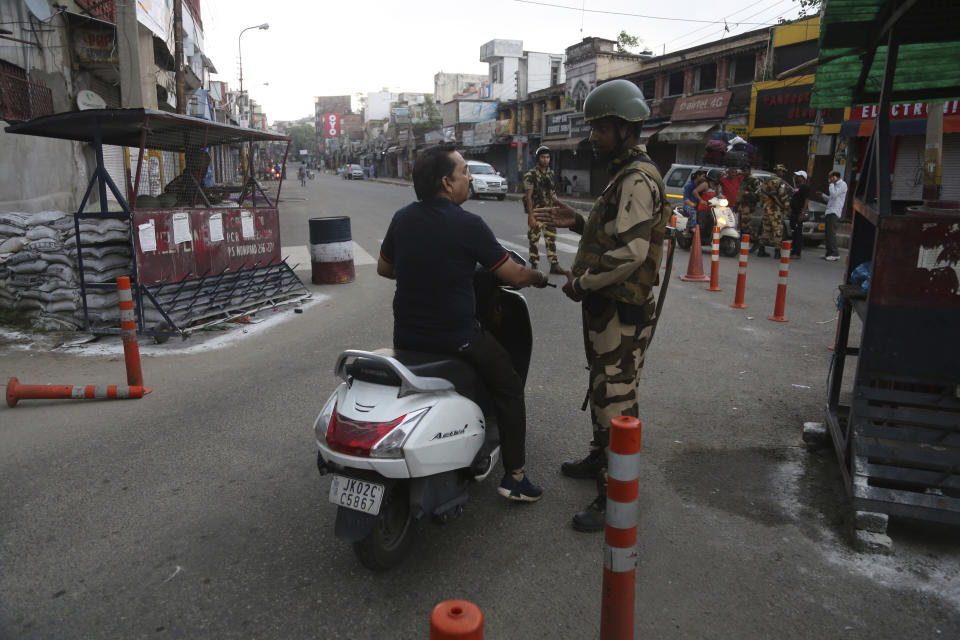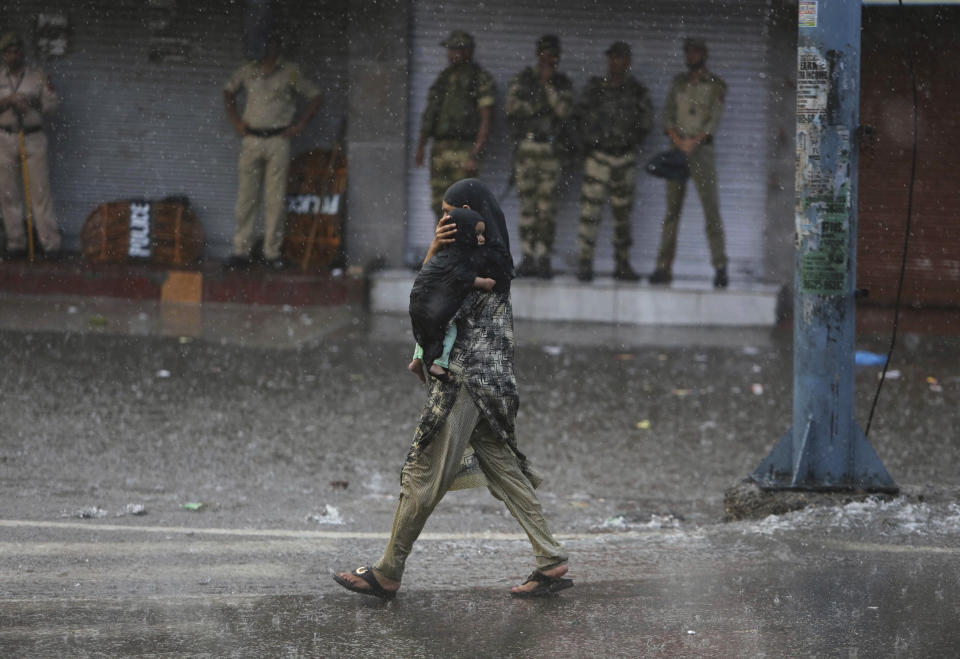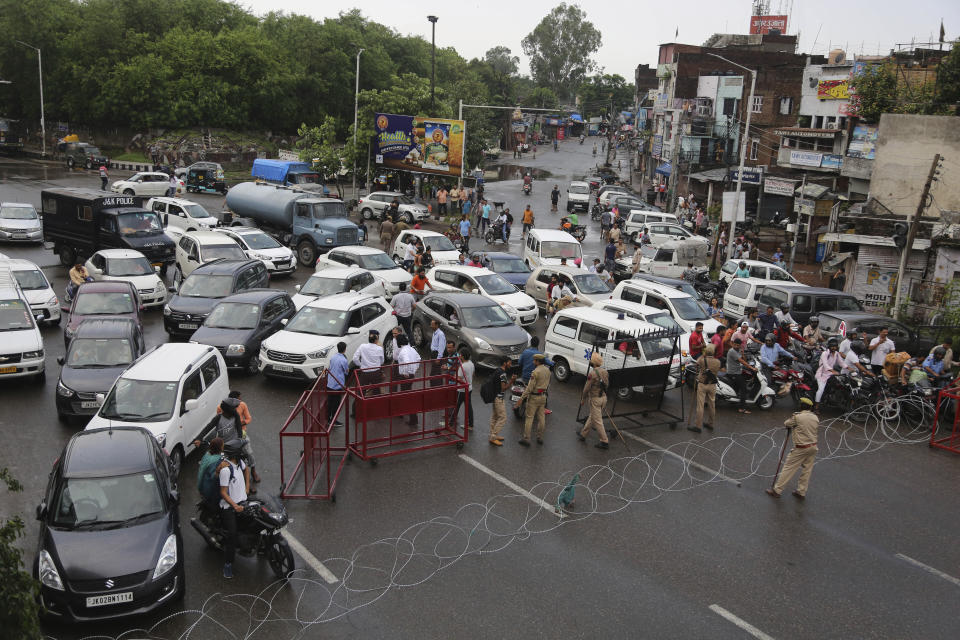The Latest: UN chief worried about rising tensions in region
SRINAGAR, India (AP) — The Latest on Indian-controlled Kashmir (all times local):
11:54 p.m.
The U.N. says Secretary-General Antonio Guterres is very concerned about rising tensions in the Kashmir region and is urging all parties "to exercise restraint."
U.N. spokesman Stephane Dujarric told reporters Monday that over the past few days the U.N. Military Observer Group in India and Pakistan "has observed and reported an increase in military activity along the Line of Control" — the highly militarized line dividing Kashmir between the two countries.
His comments followed the surprise announcement earlier Monday by India's Hindu nationalist-led government that it is moving to revoke the special status of Muslim-majority Kashmir. The government cut off communications and is deploying thousands of troops in the restive Himalayan region amid fears its actions could spark uprisings.
"We are following with concern the tense situation in the region," Dujarric said. "We're also aware of reports of restrictions on the Indian side of Kashmir, and we urge all parties to exercise restraint."
___
9:30 p.m.
Pakistani authorities have reopened an ancient temple for the country's tiny Hindu community in the industrial city of Sialkot despite increasing tensions with neighboring India over Kashmir.
The 1,000-year-old temple was closed for worship shortly after the creation of Muslim-majority Pakistan in 1947.
Monday's reopening of the temple coincided with New Delhi's decision to revoke the special status of Muslim-majority Kashmir, triggering tension between Pakistan and India.
Sialkot city shares a border with Kashmir.
Pakistan rejected the Indian move to change the status of Kashmir, which is divided between the two countries and claimed by both.
Only a few jubilant Hindus turned up to worship at the Shawala Teja Singh temple after it was reopened.
___
9 p.m.
Pakistan's prime minister has told the leaders of Turkey and Malaysia that India's decision to revoke the special status of the disputed Himalayan region of Kashmir will have serious implications for regional peace and security.
Imran Khan called Turkish President Recep Tayyip Erdogan and Malaysian Prime Minister Mahathir Mohamad on Monday to explain developments following India's revocation of the special status of Muslim-majority Kashmir.
A government statement said Erdogan assured Khan of Turkey's steadfast support of Pakistan.
It said Khan told Mahathir that the revocation of Kashmir's status violated United Nations Security Council resolutions and would harm peace and security in the region.
On Monday, India scrapped a constitutional provision that gave the state of Jammu and Kashmir its own constitution and broad decision-making rights.
___
3 p.m.
Pakistan's foreign ministry has rejected India's revocation of a special status for the portion of disputed Kashmir that it controls.
The ministry said in a statement Monday that under U.N. Security Council resolutions India cannot change the status of Kashmir, which is claimed by both countries.
It said the people of Pakistan and Kashmir will not accept the Indian action, and that Pakistan will "exercise all possible options" to block it.
On Monday, India scrapped a constitutional provision that gave the state of Jammu and Kashmir its own constitution and broad decision-making rights.
___
1:30 p.m.
Pakistan's foreign minister has rejected India's revocation of disputed Kashmir's special constitutional status, saying the move violates a U.N. resolution.
Foreign Minister Shah Mahmood Qureshi told a Pakistani TV station Monday from Saudi Arabia, where he's on a pilgrimage to Mecca, that Pakistan would step up diplomatic efforts to prevent the revocation made by presidential order from coming into effect.
The order scraps an Indian constitutional provision that forbids Indians from outside the region from buying land in the Muslim-majority territory.
Kashmir is divided between India and Pakistan and both claim the region in its entirety. Two of the three wars India and Pakistan have fought since their independence from British rule were over Kashmir.
The president of Pakistan-controlled Kashmir, Sardar Masood Khan, also rejected India's presidential order and said that India "can go to war" with Pakistan in such a situation.
___
11:45 a.m.
India's government has initiated a revocation of the special constitutional status of disputed Kashmir amid uproar in Parliament and a huge troop deployment in the region.
Home Minister Amit Shah told members of the upper house Monday that the government has decided to repeal a law that gives special status to the Himalayan region of Jammu and Kashmir by presidential order. Shah says that the government has also decided to split the state into two union territories — Jammu and Kashmir, which will have a legislature, and Ladakh, which will be ruled directly by the central government without a legislature of its own.
The law, Article 370 of the Constitution, forbids Indians outside the state from permanently settling, buying land, holding local government jobs and securing education scholarships.
Kashmir is divided between India and Pakistan and both claim the region in its entirety.
___
9 a.m.
An indefinite security lockdown is in place in the Indian-controlled portion of divided Kashmir, with thousands of newly deployed soldiers camping in police stations and government buildings around the increasingly tense region.
The deployment in recent days adds at least 10,000 troops in Kashmir, already one of the world's most militarized regions.
India also has ordered thousands of tourists and Hindu pilgrims to leave.
The measures have sparked fears that New Delhi is planning to scrap a constitutional provision that forbids Indians from outside the region from buying land in the Muslim-majority territory.
Kashmiris fear the measures would be a prelude to doing away with the region's special status and intensifying an ongoing crackdown against anti-India dissenters.



